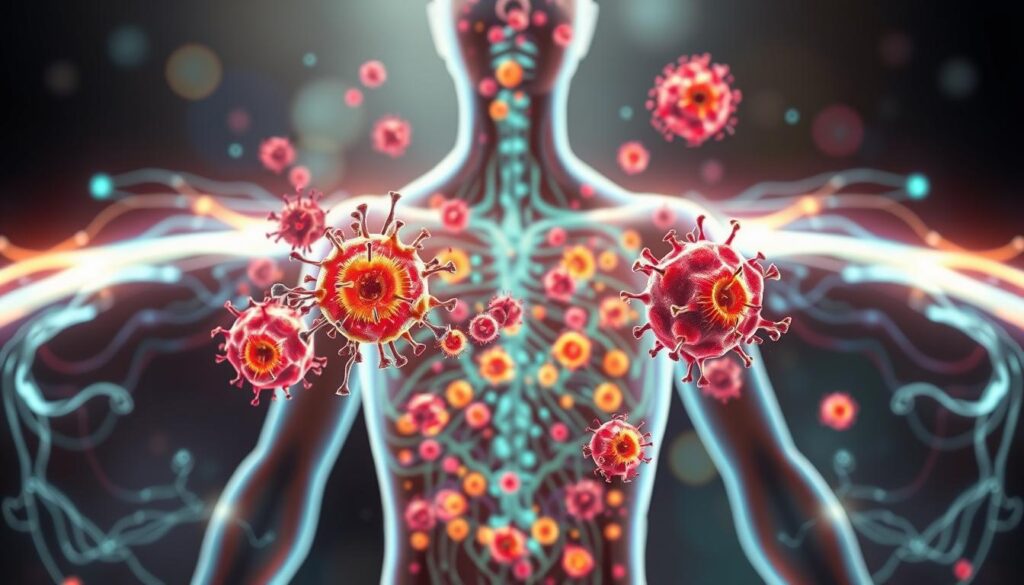Have you ever thought about how fasting might boost your immune system? New studies show that fasting cycles could be key to refreshing our immune cells. But how does this happen, and what does it mean for our health? Let’s explore the science behind “Do immune cells regenerate fasting?” and see how this old practice can strengthen our defenses.
Key Takeaways
- Fasting has been shown to promote the activation and regeneration of hematopoietic stem cells, which are responsible for producing immune cells.
- Cycles of fasting can modulate the gut microbiome and reduce autoimmunity, potentially enhancing the body’s ability to fight infections and cancer.
- The duration and severity of fasting can have varying effects on the immune system, with water-only fasting potentially causing immune impairments but partial fasting conditions providing benefits.
- Fasting-mimicking diets and intermittent fasting regimens demonstrate potent immunomodulatory effects, making them a promising approach for managing autoimmune diseases, cancer, and other conditions.
- Understanding the mechanisms by which fasting rejuvenates aging blood stem cells can lead to the development of therapies to slow down or even prevent harmful age-related declines in immune function.
Introduction to Fasting and Immune System Regeneration
Fasting, or not eating for a while, is getting more attention for its health benefits. It can mean eating less food all the time or fasting for short periods. This can be done by drinking only water or by eating less often.
Studies show fasting can slow down cell growth and boost immune cell regeneration. It works by activating special cells in our body. But, we still don’t fully understand how it does this.
What is Fasting, and Why is it Important?
Fasting, whether it’s short or long, can help our immune system and overall health. It makes our cells stressed, which helps protect and repair our body. This is because it limits the nutrients and growth factors available.
- A 2022 study found fasting helped cancer patients by lowering blood sugar and changing their immune system.
- After 72 hours of fasting, a study found our immune cells worked better and were healthier.
- A study compared eating at certain times to eating whenever and found the timed eating improved health markers.
These studies show fasting can greatly improve our immune system. This could lead to new ways to prevent and treat diseases.
“Fasting cycles have been shown to promote hematopoietic stem cell activation and regeneration of immune cells, but the mechanisms behind these effects remain poorly understood.”

The Role of Fasting in Inducing Immune Cell Regeneration
Fasting or fasting-mimicking diets can boost the body’s immune cells. This happens because fasting slows down growth and cell division. It also helps in activating stem cells.
Long fasts of 2 to 5 days can make more stem cells in the body. These stem cells help make blood and immune cells. Fasting also helps in cleaning up damaged cells, making stem cells younger.
Fasting-mimicking diets (FMD) help in making more and better stem cells. They reduce body inflammation, helping stem cells to grow and work better. Some research shows that fasting can even make us live longer by keeping stem cells healthy.
| Fasting Mechanism | Impact on Stem Cells |
|---|---|
| Downregulation of IGF1 and mTOR pathways | Promote stem cell activation and regeneration |
| Induction of autophagy | Enhance stem cell rejuvenation by removing damaged components |
| Reduction of inflammation | Create a favorable environment for stem cell thriving and regeneration |
Fasting’s role in boosting immune cells is complex. It affects many pathways and helps in cleaning up cells. More research is needed to understand how fasting works with stem cells and the immune system.

Do immune cells regenerate fasting?
Many studies have found that fasting or fasting-mimicking diets can boost the regeneration of immune cells. This shows how our bodies can naturally renew and strengthen their defenses.
Fasting creates a stress that triggers a regenerative response. This leads to the growth of new immune cells from stem cells. This process can renew and improve the immune system, helping with healthier aging, autoimmune diseases, and cancer treatment.
Fasting and Immune Cell Regeneration
Research from the University of Southern California found that prolonged fasting can regenerate immune system cells. Intermittent fasting for 16 hours or more can increase immune-boosting cells in the body.
During fasting, white blood cells break down, but then new cells grow, boosting the immune response. Fasting for 12.5 hours may not immediately affect immunity. But eating certain nutrients after fasting can greatly impact immune function.
| Nutrient | Immune-Boosting Benefits | Food Sources |
|---|---|---|
| Vitamin C | Supports the growth and function of immune cells | Citrus fruits, vegetables |
| Vitamin B6 | Plays a role in the formation of new immune cells | Bananas, green vegetables |
| Vitamin E | Acts as an antioxidant to protect immune cells | Nuts, seeds |
| Omega-3 Fatty Acids | Reduce inflammation and support immune function | Oily fish |
| Antioxidants | Protect immune cells from damage | Nuts, seeds |
| Iron | Essential for the production of immune cells | Meat, broccoli |
It’s key to avoid fatty and sugary foods after fasting to keep blood sugar and cholesterol levels stable. Also, limit processed foods and red meat, as they can harm immunity.

Fasting and Chemotherapy: Protecting the Immune System
Research shows fasting might help protect the immune system during chemotherapy. It can reduce the harm chemotherapy does to the body’s defenses. This could make the treatment more effective.
Clinical Trial Findings
A recent trial found fasting before chemotherapy lowered white blood cell counts. This is a good sign for the immune system. It means fasting might help the body fight off chemotherapy’s harmful effects better.
Studies also show fasting can kill old, damaged immune cells and create new ones. This process, called autophagy, helps rejuvenate the immune system. It makes the body stronger against cancer.
Fasting can also change how the body works. It lowers an enzyme that helps grow new cells and reduces a hormone linked to aging and cancer. These changes help protect the immune system during chemotherapy.
“Fasting cycles retard tumor growth and sensitize various cancer cell types to chemotherapy.”
A study by Pietrocola et al. in 2016 found fasting can help fight cancer. Another study by Ajona et al. in 2020 showed fasting can make lung tumors more sensitive to treatment. These findings support fasting’s role in cancer treatment.

The study of fasting and chemotherapy is ongoing. Trials like the one by De Groot et al. in 2020 are looking into fasting’s benefits. Their results will help us understand fasting’s role in cancer treatment better.
Rejuvenating Aged Blood Stem Cells
As we age, our blood stem cells don’t work as well. This leads to health problems. But, research has found a way to fix this: autophagy. This process helps old blood stem cells survive and work better in older animals.
Fasting and then eating again can make old blood stem cells young again. It resets their metabolism. This is a promising way to fight aging’s effects on our immune system.
Autophagy and Stem Cell Aging
Immunologist Katja Simon says autophagy is key to slowing down immune cell aging. Autophagy decreases with age, causing waste buildup. This leads to muscle loss, skin changes, and more.
Without autophagy, immune cells age fast. They can’t fight off infections or tumors well. This raises the risk of diseases like arthritis.
Substances like spermidine, found in fermented soy and aged cheese, boost autophagy. A study found that spermidine helped elderly people’s immune response after a COVID vaccine.
Exercise, fasting, and eating less can also boost autophagy. Research is looking into these methods for healthy aging. This could lead to better health for older people.
The findings are exciting. By using autophagy and fasting, we might fight aging’s effects on our immune system. This could make older people healthier and more resilient.
Fasting, Refeeding, and Stem Cell Rejuvenation
Fasting has many health benefits, including making old blood stem cells young again. But, the best results come when fasting is followed by eating again. This cycle makes old stem cells work like new ones, helping to renew the blood system.
Studies show fasting alone can start a process called autophagy in old blood stem cells. But, eating again is needed to finish their rejuvenation. This means using fasting and eating cycles could help keep our immune system strong as we get older.
One study found fasting for 24 hours made the intestine’s cells grow less. But, eating again after fasting made these cells grow more than when food was always available. Also, fasting and eating cycles affect important pathways for stem cell growth and healing.
| Fasting Regimen | Effect on Stem Cells |
|---|---|
| 24-hour fast | Decreased crypt cell proliferation |
| Post-fast refeeding | Increased crypt cell proliferation compared to ad libitum state |
| Fasting and refeeding cycle | Modulated insulin/PI3K and mTORC1 pathways, essential for stem cell function and tissue regeneration |
These results show fasting and eating cycles could be key to making old blood stem cells young again. By using fasting and eating together, we might find new ways to fight aging and keep our immune system strong.

Implications for Healthier Aging and Regenerative Medicine
New research on fasting and immune cell regeneration is changing how we think about aging and medicine. It shows fasting can help the immune system stay strong as we get older. This could lead to new ways to fight off diseases and keep the immune system healthy.
Scientists are eager to use these findings in treatments. They hope to create personalized plans to fight age-related illnesses. This could include treatments for autoimmune diseases.
Slowing Down Stem Cell Deterioration
Studies have shown fasting can make stem cells work better. In mice, a short fast made intestinal stem cells more active. These cells could double their growth in a lab dish.
Also, fasting can reverse the loss of stem cell function with age. This is true for both young and old mice. It looks like fasting could keep stem cells young and healthy, which is key for regenerative medicine.
“Fasting activates transcription factors called PPARs, turning on genes involved in metabolizing fatty acids. Turning off the PPAR pathway eliminates the regenerative benefits of fasting.”
This research might lead to drugs that mimic fasting’s effects. These could help people with cancer or older adults with stomach problems. It’s a big step towards better health for many people.
Fasting, Immune System, and Cancer Therapy
Research is showing that fasting could help with cancer treatment. It boosts the immune system, making it stronger against cancer. This could make treatments work better and reduce side effects from chemotherapy.
Studies have found that fasting can slow down tumor growth and make drugs work better. A 48-hour fast is needed to see these benefits in cancer patients. Fasting-mimicking diets are designed to get these benefits safely in a clinical setting.
Fasting protects healthy cells from chemotherapy’s harm. It also lowers the number of cells that help cancer grow. At the same time, it increases cells that fight cancer, boosting the immune system.
A small trial showed fasting was safe for cancer patients on chemotherapy. A low-calorie diet with chemotherapy slowed down tumors in mice. It also kept healthy cells safe.
Fasting’s role in cancer treatment is promising. It could make immunotherapy more effective for different cancers. As research grows, doctors might use fasting more in cancer treatment plans.
| Statistic | Finding |
|---|---|
| Preclinical studies | Fasting-like conditions reduce tumor growth and overcome treatment resistance when combined with standard-of-care drugs. |
| Clinical evidence | A fast of at least 48 hours is suggested for attaining clinical effects in cancer patients. |
| Medically designed fasting mimicking diets (FMDs) | Aim to mimic the effects of fasting in clinical settings. |
| Fasting or fasting-mimicking conditions | Protect normal cells against the toxic side effects of chemotherapy. |
| Fasting combined with chemotherapy | Increased the levels of common lymphoid progenitor cells (CLPs) in the bone marrow and tumor-infiltrating CD8 T cells. |
| Pilot trial | A three-day fasting-like diet was considered “safe and feasible” for 18 cancer patients on chemotherapy. |
| Fasting-mimicking diet with chemotherapy | Effective in slowing the growth of breast cancer tumors and melanoma in mice, while protecting healthy cells. |
“The combination of short-term starvation and the low-calorie fasting-like diet reduced the expression of the HO-1 gene in T regulatory cells, making it easier for chemotherapy drugs to attack cancer cells.”
Fasting or fasting-mimicking diets could greatly improve cancer treatment. They might make treatments more effective and help patients feel better. As doctors learn more, these diets could become a key part of cancer care.
Future Directions and Potential Applications
Researchers are exploring how fasting affects the immune system and regenerative medicine. They’ve found fasting can help many parts of the body, not just the immune system. This opens up new possibilities for health.
Studies are looking into how fasting makes stem cells younger. This could help us age better, fix damaged tissues, and treat diseases. For example, a study by Stekovic et al. (2019) showed fasting can slow down aging in non-obese people.
- Potential applications of fasting-induced regeneration include:
- Enhancing stem cell-based therapies for regenerative medicine
- Developing new treatments for immune-related disorders
- Promoting healthier aging by rejuvenating aged blood stem cells
- Improving the efficacy of cancer treatments by protecting the immune system
The study of fasting, the immune system, and cellular rejuvenation is exciting. It could lead to big changes in regenerative medicine and healthier aging. These discoveries might help create new treatments that let our bodies heal themselves, improving our lives.
“Fasting may be the key to unlocking the body’s hidden potential for self-renewal and rejuvenation.”
Conclusion
Fasting has amazing effects on the immune system. It can help us age better, manage autoimmune diseases, and improve cancer treatments. Fasting boosts the body’s immune cells, making it a natural way to stay healthy.
More studies are needed to understand fasting fully. But, the early results show it’s key for a strong immune system as we get older. It helps our bodies fight off diseases better, which is great for our health.
The study of immune cell regeneration, fasting, and health benefits is growing fast. This research could lead to big changes in how we prevent and treat diseases. It gives us hope for a healthier, more resilient life.





